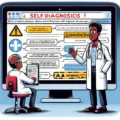With the global spread of infectious diseases such as COVID-19, face masks have become a topic of widespread discussion and debate. But beyond the media headlines and political discourse, what do medical professionals really think about the use of face masks? In this article, we’ll delve into the perspectives of doctors on the efficacy of face masks, offering insights into their recommendations and the science behind mask-wearing.
The Medical Perspective on Face Masks
Doctors and healthcare workers have long used face masks as part of their personal protective equipment (PPE). They are considered a barrier method that can prevent the spread of respiratory droplets, which are a primary mode of transmission for many viruses. The consensus among medical professionals is that wearing a face mask in public settings, especially when social distancing is not possible, can help reduce the transmission of airborne illnesses.
The Effectiveness of Different Types of Masks
There are various types of face masks available, ranging from cloth masks to surgical masks and N95 respirators. Doctors emphasize that while N95 respirators offer the highest level of protection due to their ability to filter out 95% of airborne particles, surgical masks are also effective in blocking large droplets. Cloth masks are less protective than medical-grade masks but are still beneficial in reducing the spread of viruses when used correctly and widely.
Mask-Wearing as Part of a Comprehensive Strategy
Healthcare professionals advocate that mask-wearing should be part of a broader strategy to combat infectious diseases. This includes frequent handwashing, maintaining social distancing, and staying home when feeling unwell. Masks are an added layer of protection, but they are not a substitute for other preventive measures.
The Impact of Masks on Community Health
Doctors point out that face masks can have a significant positive impact on community health. By wearing a mask, individuals can protect not only themselves but also others around them, particularly those who are vulnerable or have underlying health conditions. The collective use of masks can contribute to a decrease in the overall transmission rate of diseases within a community.
Addressing Myths and Misconceptions
Despite the medical community’s endorsement of masks, there are still myths and misconceptions that circulate. Doctors aim to clarify that masks do not cause carbon dioxide buildup or oxygen deficiency when worn properly. They also stress that masks should not instill a false sense of security and should be used in conjunction with other protective measures.
FAQ About Wearing Face Masks
- Do face masks provide complete protection against viruses?
- No, face masks are not 100% effective and should be used as part of a comprehensive preventive strategy.
- Can wearing a mask weaken the immune system?
- No, there is no scientific evidence to suggest that wearing a mask weakens the immune system.
- Should children wear face masks?
- Yes, in many cases, children over the age of two should wear masks in public settings, following local health guidelines.
- How often should I wash my cloth mask?
- Cloth masks should be washed after each use or at least daily.
- Is it safe to reuse disposable masks?
- Disposable masks are designed for single use; however, if resources are limited, they can be reused if not visibly soiled or damaged, with caution.









